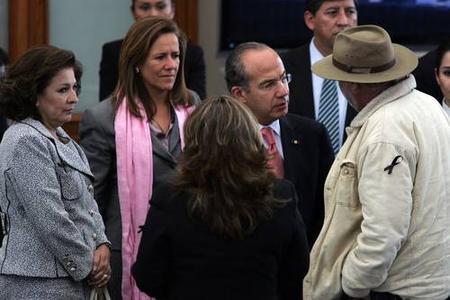
President Felipe Calderón, speaking with The New York Times reporters, October 15: There are many in the PRI [the opposition Institutional Revolutionary Party] who think the deals of the past [with organized crime] would work now. I don’t see what deal could be done, but that is the mentality many of them have. If that opinion prevails it would worry me.
Cristina Díaz, secretary general of the National Executive Committee of the PRI, October 17: The accusation is irresponsible and [we reject] that there exists any PRIista with decision-making capacity who has proposed a pact with organized crime.
Humberto Moreira, national president of the PRI: We demand [that Calderón provide either] proof of his statements or an apology.
The Presidency of the Republic: The president was just answering a question posed to him by a Times correspondent. He was not politicizing the fight against organized crime.
Sócrates Rizzo, former PRI governor of the state of Nuevo León, February 23: During the PRI governments, the president had control over drug trafficking routes, which impeded attacks on the population and the level of violence we are living through now.
Socrates Rizzo, February 25: [I was misunderstood.] We had a great alliance with all the social sectors [which minimized violence] . . . not an accord with the criminals.
Javier Sicilia, poet, speaking to cabinet members of the Calderón government on behalf of the Movement for Peace with Justice and Dignity: Your decisions [to use the military to fight drug trafficking], in addition to generating more violence and terror, are provoking the rise of paramilitary groups who, in this rarified and atrocious atmosphere, feel authorized to practice, killing more Mexicans with impunity, what they stupidly call justice.
Felipe Calderón: The state has not systematically assassinated, mutilated, or disappeared it’s victims, as has happened under military dictatorships in Argentina or in Chile or has happened in the case of Bosnia Herzegovinia.
Javier Sicilia: There is a greater threat that we the citizens detect . . . that of authoritarianism and its most brutal face, fascism. [We have to change direction before] the fascist temptation facing criminality does away with civility.”

